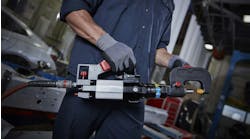You know you should be marketing your shop, but to whom? How do you determine your ideal customer? And what’s the best way to reach them, once you’ve identified them?
According to Megan Fulkerson, managing partner at 3P Marketing in Evansville, Indiana, (and formerly the chief marketing officer for a collision shop), the answer is highly individual and depends on a variety of factors.
“Marketing is extremely important for our industry because, statistically, people are only getting into a wreck every 10 or more years,” she says. “It’s important to keep in mind that if someone was in an accident many years ago, they may not remember the experience of where they took their car—so we need to always be advertising to build top-of-mind awareness. You want to do everything possible to be the shop they think to call following an accident.”
Identifying A Target Market
Identifying a target market is a little different for each shop based on what type of competitors they have (MSO or smaller shops) and what certifications they have, says Fulkerson.
A shop’s location and specialties matter, too, as does the amount of time they’ve been in business and what type of work they do most often. Fulkerson suggests, for example, that a collision shop might want to identify its target audience based on the vehicles it’s currently repairing.
“It’s a great idea to look at your customer management software and run the necessary reports to see what brand of vehicle you repair most, what is the most profitable, etc.,” she says. “Another great way to identify segments of customers you may have missed is to ask your paint company for a report that will show how many makes/models of each vehicle are on the road in your area right now. That data can give great insight as to what brands or advanced training to seek out as you grow your shop.”
Once you know who you want to direct your marketing toward, you can work on creating targeted digital advertising campaigns to specific groups of people.
“If you want to target people who are going to your competitor’s shop for an estimate, for example, we can target customers in their lobby,” Fulkerson explains. “Similarly, if you are OEM certified for Tesla, Honda, and Ford, we can also send ads to the homeowners of those specific vehicle brands to let them know you are the trained experts for their vehicle.”
If a shop owner only has the time or bandwidth for just one marketing activity, Fulkerson recommends it be this type of targeted digital marketing. “Find someone who is experienced within the collision repair industry and understands how to tailor your ads and the targeting,” she suggests. “By doing so, you can have a trusted partner to help you grow your customer base.”
Keeping Your Shop Top of Mind
Regardless of who your target audience is, the single most important thing you can do from a marketing standpoint is to keep your business top of mind. And while advertising is important, it’s equally important that you get out into the community and make your shop known to potential customers through personal interactions.
“It’s a two-fold approach—we want to ensure your shop is present online where people are seeing it regularly (through website ads, social media ads on Facebook, commercials on streaming TV, etc.) and that you or some members of your shop are doing things within the community, too,” says Fulkerson. “That could look like making some donations to local organizations or offering to help with social efforts a few times a year.”
This combination of advertising and community involvement is the exact recipe that’s proven successful for Katie Smith, co-owner of Rick’s Paint & Body in Augusta, Georgia.
A family-owned and operated business founded in 1976, Rick’s has deep roots in the community, and they make sure they remain top of mind for potential customers by staying active on social media several times a week, advertising on radio and TV and keeping themselves visible in local activities.
“My ‘top tip’ for marketing success is to always stay in front of your audience,” says Smith. “I think people sometimes scale their marketing back if they are swamped and have a large backlog of work … but I feel like when you’re doing well is when you really need to be marketing yourself. You always want to be top of mind. I look at it like this—tomorrow that backlog could be gone, and I don’t want to have to scramble to find ways to get people through the door.”
Echoing Fulkerson, Smith added that she “always wants to be the first shop that comes to mind when someone is looking for collision repair—I want potential customers to already trust us and know we can handle their repairs before they need us.”
Whether it’s a funny meme on Facebook, a professionally produced video, or a radio ad featuring her husband and fellow co-owner’s distinctive southern accent (that customers recognize even when they’re out in public), Rick’s works hard to market to a wide audience and catch everyone’s eye.
“I have always said Augusta, Georgia, is a big town with very small-town ways,” says Smith. “If you talk to a stranger long enough, you’re either going to find out you have friends in common or somehow you are related to each other. So, with that, I focus a lot on the fact that we are local. I also push that we are family owned and operated. If someone requests to speak to the manager/owner, one of us is always here.”
As for community events, Smith and her team genuinely enjoy them and treat them as an important component of their marketing strategy to maintain a positive public image.
“There is a large concert here every year, and the only way to get tickets is to win them,” she says. “The local radio station has ‘ticket stops’ at local businesses, places where you stop by and put your name in to win. We always host one of the largest ticket stops in the area. People really enjoy coming to ours. We have it on a weekend and give away pizza, chips, drinks, and lots of promotional gear. We also host a Christmas event every year. We have an amazing Santa come in, and I line up a great local photographer to come in to take photos. The Santa we use has a large local following. We do all this complimentary to everyone. This year we had about 100 kids stop by.”
Stretching Your Marketing Dollar
While Smith believes that all shop owners should be prioritizing their marketing efforts, she emphasized that she doesn’t think you need to spend a fortune to do it effectively. At Rick’s, for example, they find ways to repurpose their videos so they can use the same one multiple times, without it becoming repetitive.
“We have mostly self-managed our marketing until last year,” shared Smith. “We now have an amazing company that helps us with our ad spend, Google AdWords and videos. The videos they produce for us are amazing. I have a very large hand in deciding what direction we go with those. There are ways to create content that can then be split up and used in different ways to turn that one video into three or four different ones … we did this with a ‘decades’ spot, for example. The idea behind the video was that at Rick’s, we’ve been handing keys back to happy customers for decades. We did the original video, then throughout the year, we would release the snippet of a decade. It seemed to work really well for us!”
Lastly, when deciding what kind of marketing pieces to create, Smith suggests other shop owners consider the type of advertising that catches their attention and go from there in planning a marketing strategy:
“Pretend you’re the customer, what do you enjoy seeing on social media from businesses and what would make you want to stop by an event?”




